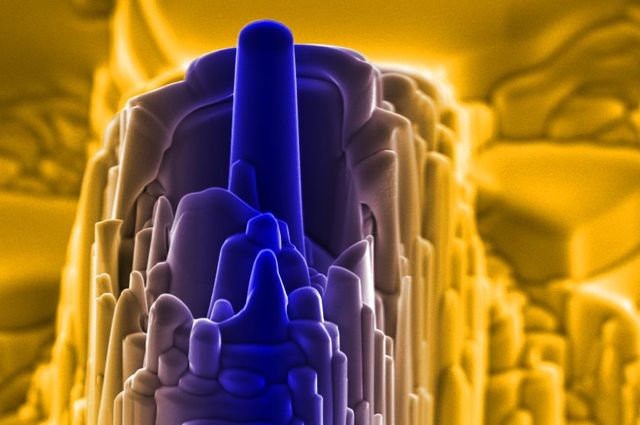 Electron microscope image of a micrometer-scale carbide pillar carved out of a single crystal using focused ion beams.(Lawrence Berkeley National Laboratory)
Electron microscope image of a micrometer-scale carbide pillar carved out of a single crystal using focused ion beams.(Lawrence Berkeley National Laboratory)
Materials scientists from the UCLA Henry Samueli School of Engineering and Applied Science have discovered new methods to produce highly strong ceramics with properties such as exceptional hardness, capable of withstanding very high temperatures and better corrosion resistance than metals, and still possess the ability to be ductile i.e. deform or dent without fracturing - a ceramic that can bend but not break.
The scientists chose to work with compounds known as transition-metal carbides which have atoms linked together by chemical bonds referred to as ionic, metallic and covalent. The scientists feel that it is these three bonds that provide these materials with toughness. To prove this theory, they conducted compression tests inside a transmission electron microscope on single crystals of two transition-metal carbides, tantalum carbide and zirconium carbide. At room temperature these crystals deformed but did not crack. This illustrated that size and orientation of the crystals were key to the mechanical behavior of the materials.
Ultra–high-temperature ceramics are highly desirable in aerospace and other industries where durable structural components are required to maintain their strength and stability at elevated temperatures. Transition-metal carbides are attractive for these applications because they are very hard and do not melt until they reach very high temperatures.
Suneel Kodambaka, associate professor of materials science and engineering
A measure of a material’s resistance to mechanical pressure is mostly referred to as ‘hardness’ by materials scientists, and this property can be determined in units known as Pascals. Transition-metal carbides have hardness above 20GPa while steel has about 1-2GPa. Similarly, transition-metal carbides melt at 6,300°F and above while steel melts at around 2,700°F.
Despite these favorable qualities, these ceramics are more brittle compared to steels at room temperature. Our studies showed how their crystals slip, an atomic-scale process that controls malleability, at room temperature. These results could help engineer the microstructures of ceramic components to tailor their mechanical properties.
Kodambaka
Currently, in structural applications such as nuclear power plants, and in machinery such as aircraft engines and turbines, high-strength metallic alloys are used rather than ceramics. However, making use of ductile ceramics would greatly enhance the performance and durability of the components.
The UCLA researchers believe that these novel ceramics could find use even in flexible, strong and radiation-resistant foils for solar sails, which are used to thrust spacecraft, and in tiny mechanical parts such as in micro- and nano-electromechanical units.
Thus the UCLA study validates the creation of ductile ceramics using transition-metal carbides and maybe even transition-metal nitrides, which have comparable structures. Going forward, more research is required to analyze how atomic-scale mechanisms affect the plasticity of these materials.
The research was published as an invited feature article in the Journal of the American Ceramics Society. The paper’s lead author was Sara Kiani, who received her doctorate at UCLA while studying with Jenn-Ming Yang, professor of materials science and engineering, and UCLA Engineering’s associate dean of international initiatives and online programs.
The research was funded by the Aerospace Materials for Extreme Environments Division, part of the Air Force Office of Scientific Research.
References